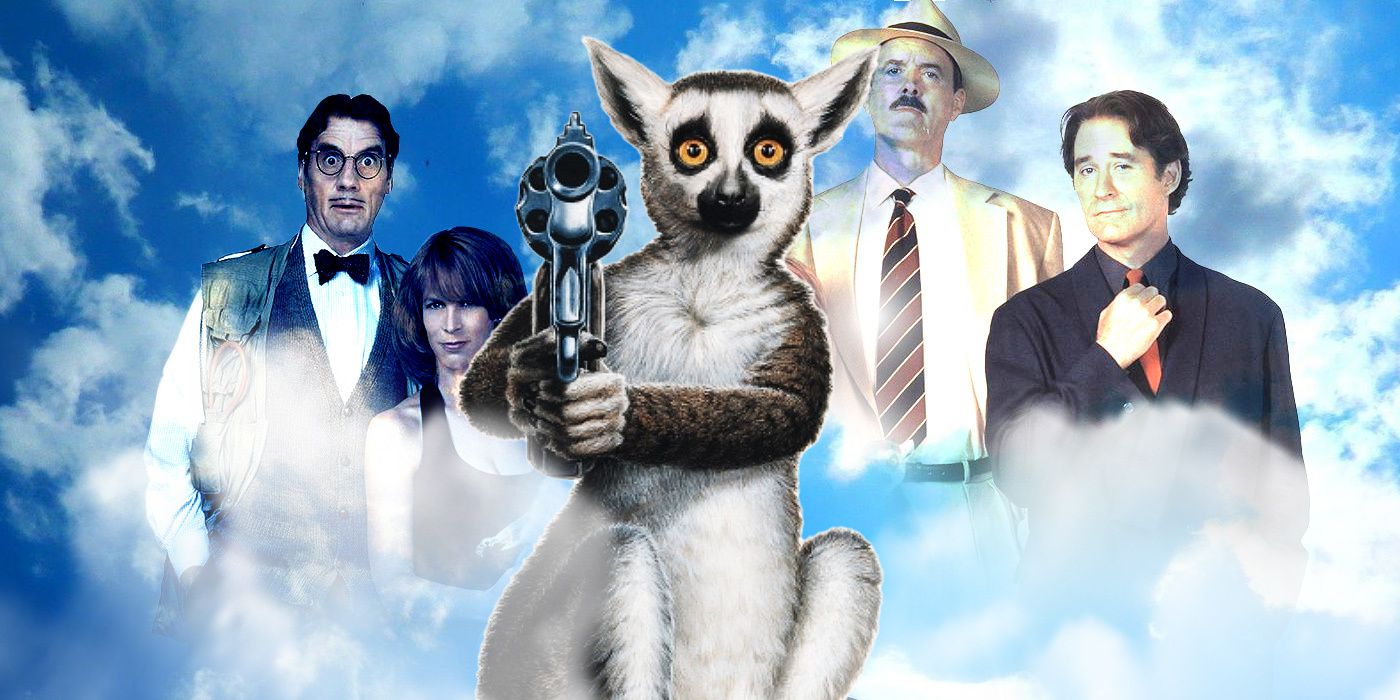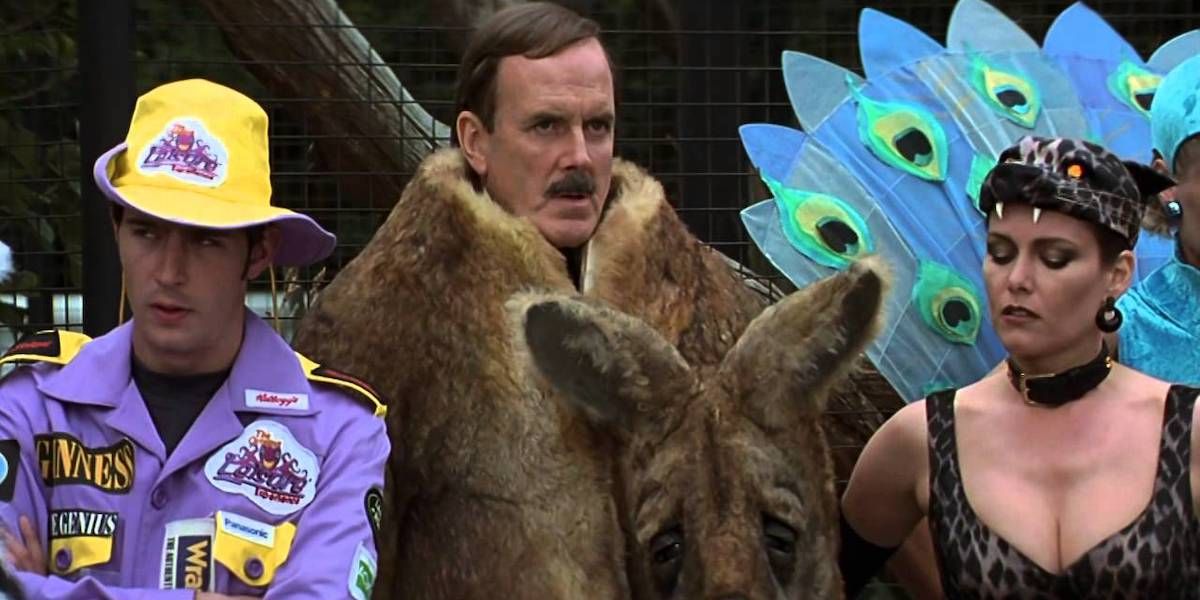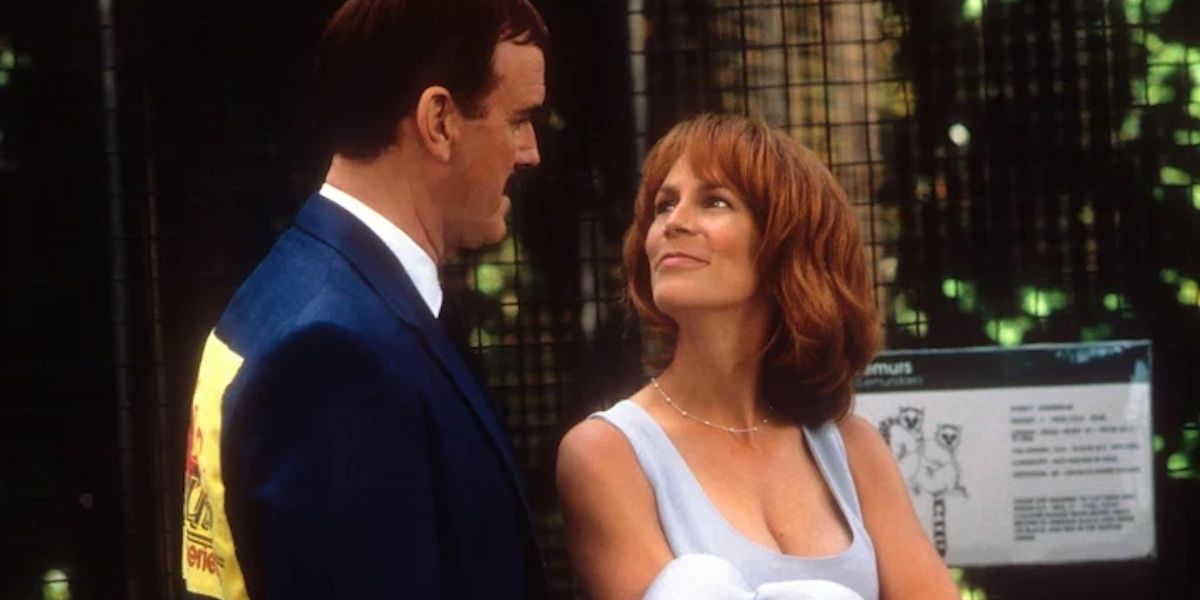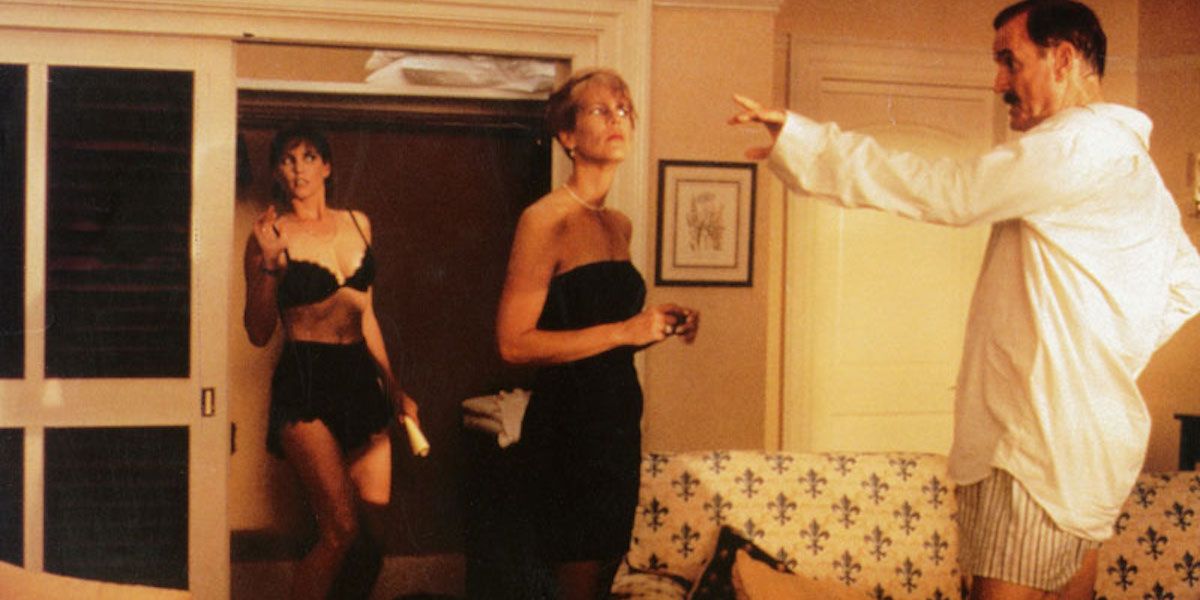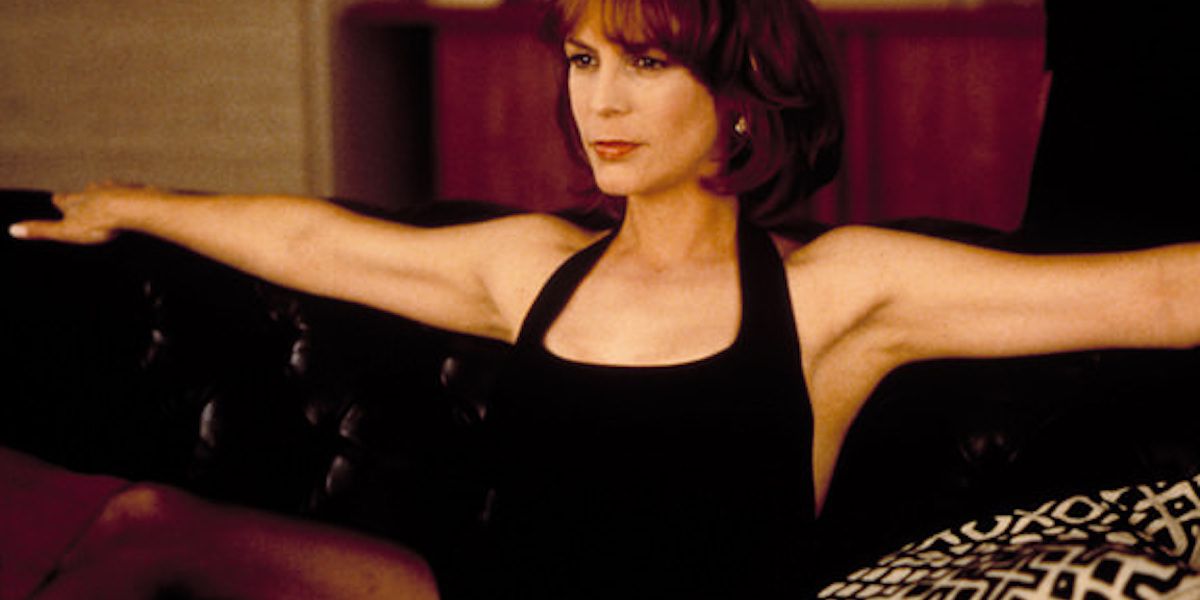A Fish Called Wanda was a huge success that somehow bridged the gap between British and American humor, an infamous void separating two cultures with a common language. Critics loved it, audiences rolled in the aisles and allegedly even died of laughter, River Phoenix stood up and applauded when he was ousted by Kevin Kline at the 1989 Academy Awards. So great was its influence that the follow-up project its four stars collaborated on could never really win. Fierce Creatures was the redheaded stepchild: it was genetically unrelated, but could never be looked at in its own right, causing all its merits to fly under the radar.
The stars of Fierce Creatures take on new incarnations of their Wanda characters: John Cleese is an uptight Englishman just dying to preserve his reputation, Kevin Kline is the eccentric antihero, Jamie Lee Curtis is the sexpot who forms a love triangle between them, and Michael Palin is the awkward comic relief. Octopus Inc. is the big bad corporation that ‘80s and ‘90s films were so fond of using as a central antagonist, and the main characters are all under its thumb in some capacity. Willa Weston (Curtis) has been assigned to turn a failing zoo in England into a flagship attraction that will expand into a franchise; Rollo Lee (Cleese) is a former police officer-turned-director who handles the day-to-day operations of the place; Vince (Kline) is the loathsome manchild heir to Octopus boss Rod McCain (also Kline) and has been sent to help out because no one can stand him. Bugsy (Palin) is one of the animal keepers at the zoo who protests the corporate savagery going on. Their respective approaches to life are guided by love for their work, or lack thereof.
As with any John Cleese piece, Fierce Creatures provides a rather biting commentary on certain aspects of society, in this case commercialism, and the priority of profit over wellbeing. Rollo has been sent to the zoo full of corporate nonsense, and rather than meet his new staff on a personal level, introduces himself via a stuffy presentation (complete with visual aids) that outlines profit targets, percentages and his grand plan to get the zoo making money again: fierce creatures. He declares that any animal within the zoo that could not be considered a danger to humans will be evicted, causing the keepers of smaller animals to take amusingly drastic measures to convince him of the dangers they pose. One way or another, everybody is determined that the zoo will remain open, and preferably become successful.
The company’s tactics for reaching its goals go from bad to worse under the influence of Vince. The keepers’ khaki uniforms are at first replaced with vibrantly-coloured ones patchworked with sponsorship logos like a F1 driver; then the uniforms are replaced entirely with animal fancy dress - the women notably get the sexier costumes that constitute a leotard and headpiece, while the men are stuck in pot-bellied penguin outfits. Every surface of the zoo is plastered with big crude billboards, tigers wear Smirnoff Vodka jackets, and Bruce Springsteen has sponsored a tortoise (well, he hasn’t, but hey, technicalities). Vince even goes as far as to install animatronic creatures in the enclosures. The bottom line is that he only cares to meet the bare minimum requirements his father has for him so that he can eventually inherit a lot of money, and steal some more in the meantime. Customer satisfaction and animal welfare be damned.
The hateability of Vince, and his subsequent rivalry with Rollo, is instrumental to the success of the movie. He is selfish, misogynistic, convinced of his own sexual prowess and ultimately very insecure. So when the attraction between Willa and Rollo becomes obvious, he can’t handle the idea of being rejected in favor of someone who he deems “weird and unattractive”. A running joke sees Rollo accidentally giving the impression that he holds wild orgies that involve female keepers (and sometimes even the animals); Vince takes this as a personal affront to his masculinity, lamenting, “How does he get three girls?! And where does the third one go?” Kline falls back into this Otto-style role with ease, bringing that same sense of quasi-charming sociopathy and some great physical delivery. Keeping a character this unlikeable funny is no mean feat, and Kline charges at the challenge.
Willa’s romantic intentions are something of a logical stumbling block for the movie. As in Wanda, she flirts with both Cleese and Kline, never convincingly attaching herself to either. She will randomly turn on the charm with the men when what has narratively come before it suggests she should be annoyed with them. Then when they actually earn her affection, she is distant with them. A nice addition to the love triangle though is an actual resolution, in which the two men briefly hash out their differences. Vince drops the rivalry in a heartbeat when it is suggested that he walk away with the billions of dollars his father left behind, and Rollo gets to be with Willa. This brief exchange gives the ending a nice feeling of camaraderie, in which the characters, despite their huge differences and acrimonious relationships, unite in a common cause and go away happy in their own ways.
The ending of the movie provides a really amusing conclusion to the story, albeit not an entirely believable one. Vince has been stealing money from the zoo, and his old man “Rod Almighty” comes over to fire him in person, with the police due to follow shortly. Within this time, a thoroughly unexpected accident causes Rod to fall down dead, and the others to scramble for a coverup, knowing the authorities are just minutes away. This gives way to a rather implausible switcheroo, in which they disguise Vince as his dad using such implements as cotton wool and flea spray, and he has to improvise his way out of trouble. His act culminates in a staged suicide that would explain away the dead body; it’s all pretty shrewd and entertaining, except for the three uniformed coppers who just stand around exchanging glances when Vince repeatedly declares his intentions to end it and locks himself in a tool shed. When they finally burst in on the real dead body, they declare, “Sorry, we didn’t realize.” Cue multiple face-palming clip from The Naked Gun.
Of course, the realities of this situation are overlooked: would it not take only a brief investigation to find the discrepancy between the wound and the angle of attack? Would those coppers be reprimanded for doing nothing to intervene with suicide plans? After all the tumbling, pushing and pulling of Rod’s body, would an autopsy not find these additional injuries and have questions? In the grand tradition of Monty Python, this movie does require a certain suspension of disbelief. Even Wanda required this to a certain extent: George’s violent courtroom outburst, Otto’s survival of being steamrolled, being able to find parking at the front door of Heathrow airport.
There are a few bits that seem juvenile and don’t really land. One of Rod’s little character tics is to immediately follow a burp with a fart, or vice versa, when he finishes talking. Although it does demonstrate what an uncouth and inconsiderate fellow he is, it seems perhaps a little low-brow for the likes of a Cleese script. Similarly, Rollo’s irrepressible infatuation for Willa causes him a number of Freudian slips that any schoolboy would holler at, usually centered around breasts and nuts. These can be forgiven though in the face of Vince’s shenanigans, and the sharp interjections of some of the keepers, particularly Palin as Bugsy and Robert Lindsay as Lotterby. Combining the traits of a number of his previous characters, such as the Ex-Leper from Life of Brian and the Yorkshire protestant from The Meaning of Life, Palin is the overly-knowledgeable contrarian who is always lurking in the background to jump out at Rollo and lecture him about his cynical business tactics. Lotterby, meanwhile, is a cantankerous cockney who masterminds various manipulations, including a stark warning about the ability of meerkats to strip a human carcass, dubbing them the Piranhas of the Desert.
The whole ensemble cast, in fact, round out the world of the zoo and amplify the knock-on effect of Rod’s cut-throat attitude and Vince’s selfishness. They are each granted enough development to become actual characters, whose individual reactions to scenarios the audience can anticipate. Diminutive Reggie (Ronnie Corbett) is an excitable sea lion keeper; emotional Pip (Cynthia Cleese) cares for small mammals and is often carrying some cuddly creature, like Hannibal Lecter’s portrait of Starling holding her beloved lamb; Cub (Bond girl Carey Lowell) easily leans into the emotional blackmail of Rollo. Maria Aitken, who gave such a wonderfully stuffy performance as Wendy in Wanda, is Rollo’s stifled secretary. The various staff members offer lots of personality for the leads to play off of, and are given some good material to have fun with and make their own.
As good a writer and comedian as John Cleese is, he is only one part of the machine that is a film. Wanda was helmed by Ealing Studios legend Charles Crichton, a renowned comedy director whose portfolio includes classics like The Lavender Hill Mob. Fierce Creatures does suffer somewhat from a lack of sense and linearity: TV director Robert Young did the movie, but when reshoots were required he was unavailable, leading to Fred Schepisi of Roxanne and Mr. Baseball fame taking over. It is perhaps not a coincidence that the ending - under the guidance of Schepisi - is the most amusing part, if sort of nonsensical, and feels like a solid conclusion to a story that was coasting somewhat.
Fierce Creatures is no A Fish Called Wanda, that’s for sure. But stripping away all the other factors that made Wanda great, four brilliant comedic actors are the nucleus. These people have been close friends for decades, as evidenced by the talk show circuit appearances they gave for Wanda in 1988. Even when the script stumbles, the dynamic team of Cleese Curtis Kline & Palin give it the heart and the chemistry that it needs. It is not as tightly written and directed as Wanda, nor did it hit upon the zeitgeist of its era or culture, but what it has is a family-business quality that radiates passion and fun and enjoyment. It feels almost like a long-lost Monty Python movie or television special: not the gang’s finest hour, but a good time nonetheless.

